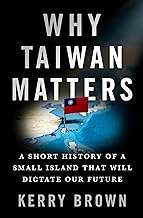❝ Once China finds you, it doesn’t leave you alone."
– Kerry Brown, reflecting on his lifelong connection to China
In Episode 66 of The Hale Report, Lyric Hughes Hale interviews Kerry Brown. His new book Why Taiwan Matters: A Short History of a Small Island that will Dictate Our Future was released today in the US. It is sobering and, I think, realistic. Professor Brown doesn’t see a way out of the current status quo in Taiwan:
❝ For today, strenuous defence of the stalemate is all that we can meaningfully do. Anything else is insanity.
Very few people in the West know much about China’s history and cultural perspective on the rest of the world, yet that is critical to understand the most important relationship in the world today, The United States and China.
Kerry Brown is Professor of Chinese Studies and Director of the Lau China Institute at King's College London, where he specializes in Chinese history, international relations, and politics.
He has a master’s degree from Cambridge and a PhD in Chinese politics and language from Leeds University. From 1998 to 2005, he served as First Secretary at the British Embassy in Beijing.
To say he is a prolific writer requires a new word to supersede prolific. If you have an interest in Chinese history, explore Kerry Brown’s writing. He takes a complex subject and writes with elegant clarity. You can find his full repertoire on his website here: Kerry Brown - Sinologist and follow him on X as well @Bkerrychina
💬 Key Moments
Introduction
Highlighting his expertise, his role at King's College London, and his upcoming book on Taiwan, described as dictating "the global future."
The Origins of His Interest in China:
His "accidental" journey to China after the Tiananmen Square Massacre, the affinity he felt for the country.
Xi Jinping's Early Life and Political Ascendancy:
Brown's analysis of Xi's perseverance in joining the Communist Party and his transformation into "a creature of the party." The remark about Xi's ten attempts to join the party stands out as an anecdote of Xi’s resilience.
Comparison Between Trump and Xi Jinping:
Brown's insight into their political styles: “Trump is very transparent; Xi Jinping is a cipher.” He humorously predicts the challenge Xi might face managing Trump.
Cultural Revolution's Lasting Impact:
Brown's reflections on how this turbulent era shaped China and its leaders, with a poignant discussion on the silence surrounding its history.
The Taiwan Issue:
Brown’s argument that the root problem between China and the West is "cultural" rather than political or economic, and host Lyric Hale’s view that Taiwan is the "unfinished business of World War II."
Xi Jinping’s Leadership Challenges:
Discussion of Brown’s concerns about Xi’s centralized power creating a single point of failure, raising concerns about his limited grasp of economics, prioritizing of politics, and the risks of miscalculation.
China’s Global Role and Technological Advancements:
A discussion of China’s Belt and Road Initiative, its dominance as a trading partner for over 120 countries, and China’s surprising advancements in AI and life sciences.
Decline in China Expertise in the West:
The concerning trend of fewer scholars studying China and Chinese, and the consequences for US and UK policymaking and engagement.
The Dinner Party Hypothetical:
Brown discusses the historical figures he’d dine with: Genghis Khan and Kangxi, in response to Lyric Hale’s standard closing question on the Hale Report.
Did you know…⧉
The Kangxi Emperor (1654–1722) was one of China's most revered and consequential rulers. As the fourth emperor of the Qing Dynasty, he ruled China from 1661 to 1722, a remarkable 61 years, making him one of the longest-reigning emperors in Chinese history. Kangxi is celebrated for his wisdom, military prowess, and ability to balance diverse interests within a vast and complex realm. Key accomplishments:
⧉ Consolidated Qing control over China by quelling rebellions and stabilizing the empire.
⧉ Annexed Taiwan in 1683 after defeating the Kingdom of Tungning, securing Qing control over the island.
⧉ Fostered economic prosperity through agrarian reforms, flood control projects, and reduced taxation.
⧉ Promoted science and culture, inviting Jesuit scholars to his court, which led to exchanges in astronomy, mathematics, and cartography.Closing Thoughts from Our Editor
Although China and the US have recently been pulling away from each other, as the market reaction to the Chinese AI firm DeepSeek revealed, the connections between the two are strong and in some sense, unbreakable. How do we deal with this new world?
Many thanks to Kerry Brown for joining me for this podcast, and to all the people behind the scenes who make econVue possible, especially our producer, Sam Fu.
For new listeners, econVue is a home for independent voices and expert analysis of critical global economic issues. You can also find The Hale Report on Spotify and Apple Podcasts.
Don’t miss out on more insightful conversations — share The Hale Report with your network!
Lyric Hughes Hale
Lyric Hughes Hale serves as Editor-in-Chief of Econvue, which publishes a newsletter, econVue+. She hosts The Hale Report, a podcast series on global economics. She is Director of Research at Hale Strategic
📍Chicago















